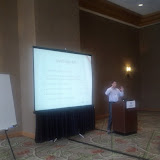Here's a question I get asked a lot: Why does Google do it? Why create things and give them away for free? Why is the Google Maps API free? What does Google get out of Google Earth?
Because it's the right thing to do. The Google Maps API was the world's first monster web mashup platform and is still the most used web API in the world. When we started Google Maps, we thought "Oh great, people can search on maps for directions, and look at satellite imagery." We though we were making a really cool app that people could visit. And we did.
But external developers showed us how it could be used to create mashup, data visualizations that really gave meaning to data. And they could do it without having a geography degree or a certification in GIS software. And they could do it with that then unique slippy map feel that we now expect from Google Maps. So we released the Maps API.
Because we could get sites like HealthMap, or the Ushahidi project. We did it because people wanted to see real estate on maps. We did it because mapping crime alerts was meaningful to people. We did it because people want to share KML files, mark up the earth, and have now created over 1 billion of them. We did it because in a crisis, people can turn to our maps and yours.
Sure, there's a business model behind it, Google makes money on advertising, and the more sites out there, the more people are search. So, yeah. And we do make money from people who want to make the maps private, or offline.
But fundamentally, we do it because it's the right thing to do, we do it because we believe that people want to, that they benefit from using maps as a platform for understanding data.
Because it's the right thing to do. The Google Maps API was the world's first monster web mashup platform and is still the most used web API in the world. When we started Google Maps, we thought "Oh great, people can search on maps for directions, and look at satellite imagery." We though we were making a really cool app that people could visit. And we did.
But external developers showed us how it could be used to create mashup, data visualizations that really gave meaning to data. And they could do it without having a geography degree or a certification in GIS software. And they could do it with that then unique slippy map feel that we now expect from Google Maps. So we released the Maps API.
Because we could get sites like HealthMap, or the Ushahidi project. We did it because people wanted to see real estate on maps. We did it because mapping crime alerts was meaningful to people. We did it because people want to share KML files, mark up the earth, and have now created over 1 billion of them. We did it because in a crisis, people can turn to our maps and yours.
Sure, there's a business model behind it, Google makes money on advertising, and the more sites out there, the more people are search. So, yeah. And we do make money from people who want to make the maps private, or offline.
But fundamentally, we do it because it's the right thing to do, we do it because we believe that people want to, that they benefit from using maps as a platform for understanding data.
